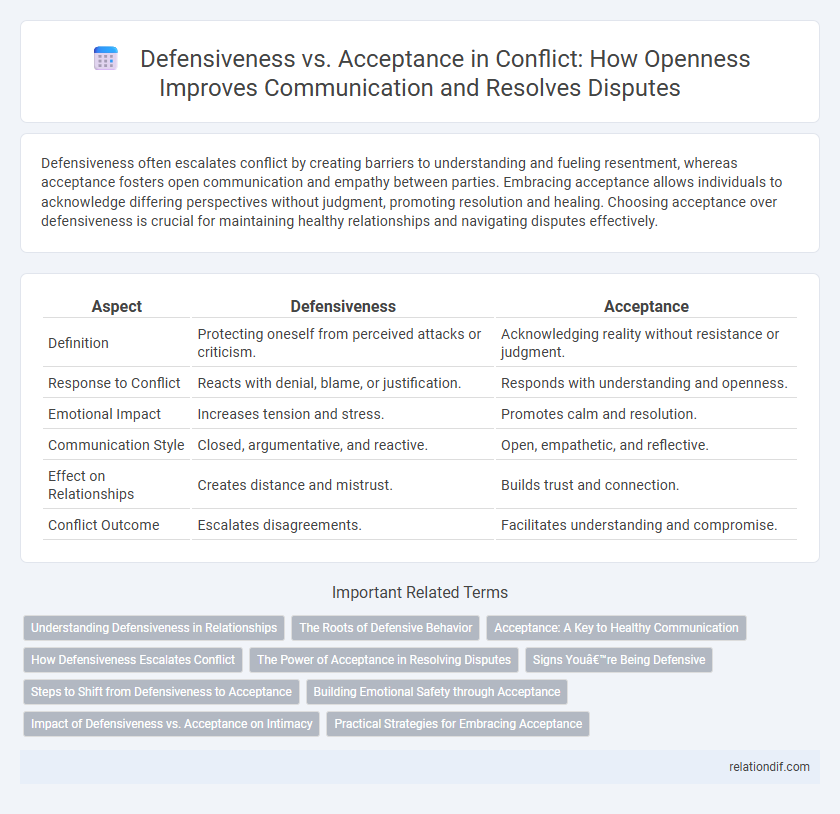Defensiveness often escalates conflict by creating barriers to understanding and fueling resentment, whereas acceptance fosters open communication and empathy between parties. Embracing acceptance allows individuals to acknowledge differing perspectives without judgment, promoting resolution and healing. Choosing acceptance over defensiveness is crucial for maintaining healthy relationships and navigating disputes effectively.
Table of Comparison
| Aspect | Defensiveness | Acceptance |
|---|---|---|
| Definition | Protecting oneself from perceived attacks or criticism. | Acknowledging reality without resistance or judgment. |
| Response to Conflict | Reacts with denial, blame, or justification. | Responds with understanding and openness. |
| Emotional Impact | Increases tension and stress. | Promotes calm and resolution. |
| Communication Style | Closed, argumentative, and reactive. | Open, empathetic, and reflective. |
| Effect on Relationships | Creates distance and mistrust. | Builds trust and connection. |
| Conflict Outcome | Escalates disagreements. | Facilitates understanding and compromise. |
Understanding Defensiveness in Relationships
Defensiveness in relationships often stems from fear of criticism or vulnerability, triggering protective responses that hinder open communication. Recognizing these defensive behaviors allows partners to create a safer emotional space, fostering trust and empathy. Embracing acceptance rather than defensiveness promotes healthier conflict resolution and deepens relational intimacy.
The Roots of Defensive Behavior
Defensive behavior often stems from deep-rooted fears of vulnerability and perceived threats to self-esteem. Psychological studies highlight that early adverse experiences and insecure attachment patterns significantly contribute to heightened defensiveness. Neuroscientific research links the amygdala's hyperactivity with defensive responses, underscoring the biological basis of this behavior in conflict situations.
Acceptance: A Key to Healthy Communication
Acceptance fosters open communication by allowing individuals to listen without judgment and validate others' perspectives, which reduces defensiveness and escalates productive dialogue. Embracing acceptance in conflict leads to emotional safety, encouraging transparency and trust between parties involved. This approach promotes resolution by shifting focus from winning an argument to understanding and collaboration.
How Defensiveness Escalates Conflict
Defensiveness intensifies conflict by triggering reactive responses that inhibit open communication and understanding. This behavior often leads to misinterpretations and an entrenched "us versus them" mentality, escalating tensions. Acceptance fosters empathy and de-escalates disputes by promoting active listening and validation of differing perspectives.
The Power of Acceptance in Resolving Disputes
Acceptance plays a crucial role in resolving disputes by fostering understanding and reducing emotional resistance, which often escalates conflicts. Embracing acceptance allows parties to acknowledge differing perspectives without judgment, paving the way for effective communication and collaborative problem-solving. This approach strengthens relationships and promotes long-term conflict resolution by prioritizing empathy and mutual respect over defensiveness.
Signs You’re Being Defensive
Signs you're being defensive during conflict include interrupting others, dismissing their viewpoints, and making excuses to avoid accountability. Physical cues such as crossing arms, raising voice, or avoiding eye contact often signal defensiveness as well. Recognizing these behaviors helps shift toward acceptance and fosters more productive, solution-oriented conversations.
Steps to Shift from Defensiveness to Acceptance
Recognizing defensive reactions as natural emotional responses enables a conscious choice to pause and reflect before responding. Actively listening to understand opposing perspectives without judgment fosters empathy and reduces tension during conflicts. Practicing self-awareness and reframing criticism as constructive feedback supports a mindset shift from defensiveness to acceptance, improving communication and resolution outcomes.
Building Emotional Safety through Acceptance
Building emotional safety in conflict relies on acceptance rather than defensiveness, fostering a space where individuals feel heard and validated. Embracing acceptance reduces reactive barriers, encouraging open communication and mutual understanding. This approach strengthens trust and promotes collaborative resolution by prioritizing empathy and respect over judgment.
Impact of Defensiveness vs. Acceptance on Intimacy
Defensiveness in conflict creates emotional barriers that hinder trust and reduce emotional closeness, significantly damaging intimacy in relationships. Acceptance fosters open communication and vulnerability, allowing partners to feel heard and valued, which strengthens intimacy. Studies reveal that couples practicing acceptance report higher satisfaction and deeper emotional bonds compared to those exhibiting defensiveness.
Practical Strategies for Embracing Acceptance
Adopting practical strategies such as active listening, mindfulness, and empathy cultivates acceptance during conflicts, reducing defensiveness and fostering constructive dialogue. Recognizing personal triggers and reframing negative thoughts enhances emotional regulation, allowing individuals to respond with openness rather than resistance. Consistent practice of these techniques strengthens relational trust and promotes resolution by prioritizing understanding over judgment.
Defensiveness vs Acceptance Infographic

 relationdif.com
relationdif.com